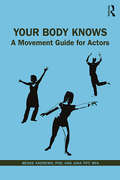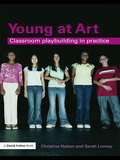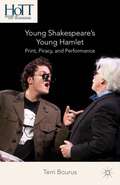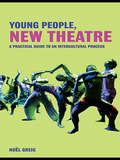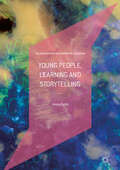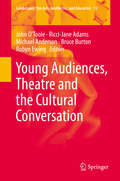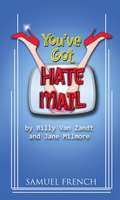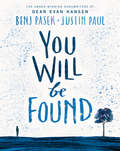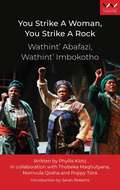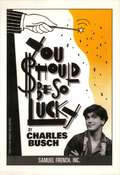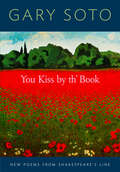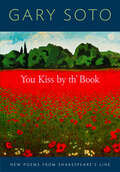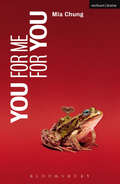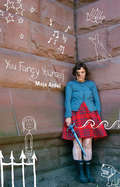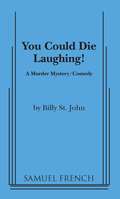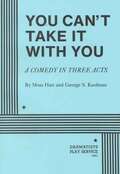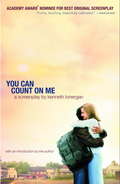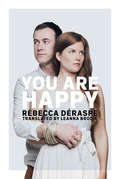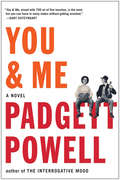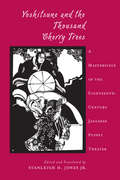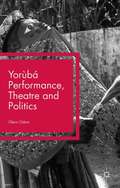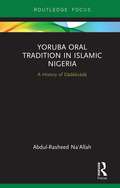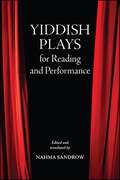- Table View
- List View
Your Body Knows: A Movement Guide for Actors
by Jana Tift Meade AndrewsYour Body Knows provides the foundation actors need to move with ease and power. It is a practical guide to movement starting at the very beginning: knowing your body and experiencing how it works. Through the work of F.M. Alexander, Rudolf Laban, and Michael Chekhov, this book offers basic training in movement fundamentals. Its step-by-step process supports the actor's work in any acting or movement training program and as a working professional. The book focuses on three main areas of exploration: Body facts – Know your body and its design for movement. Let go of misinformed ideas about your body. Move more freely, avoid injury, and develop a strong body-mind connection. Movement facts – What is movement? Discover the movement fundamentals that can serve your art. Explore new ways of moving. Creative Inspiration – Connect your body, mind, and imagination to liberate authentic and expressive character movement. Your Body Knows: A Movement Guide for Actors is an excellent resource for acting students and their teachers, promoting a strong onstage presence and awakening unlimited potential for creative expression.
Young at Art: Classroom Playbuilding in Practice
by Christine Hatton Sarah LovesyYoung at Art is a practical guide to playbuilding for teachers working with students at an upper primary and secondary level. Focusing on an area often neglected in traditional drama text books, the book covers the process of devising drama, and the teacher’s role in facilitating students to collectively become playwrights, actors, designers, directors and critics of their ensemble work. The playbuilding process is covered in a structured manner, which includes: Mapping the Territory: identifying critical issues relating to teaching and learning in playbuilding, and laying the basic foundations of understandings and practice. Levels at Work: offering three approaches to playbuilding, catering for a range of learning experiences. Playbuilding for All: explores theatre practitioners’ techniques, working with students’ personal stories and narratives and playbuilding with a contemporary edge. An essential guide for all drama teachers Young at Art covers practical teaching issues and strategies for working with groups of students to help them perform their playbuilt stories to an audience, as well as techniques for student assessment and evaluation, providing a wealth of exemplary starting points and approaches. The book offers detailed guidance on working with students to help facilitate the collaborative creative and reflective processes, offering practical ideas and structures which can be easily implemented in the classroom.
Young Shakespeare’s Young Hamlet
by Terri BourusOne of the most vexing textual, theatrical, and interpretive puzzles in Shakespeare studies is the existence of three different versions of Hamlet. In this groundbreaking work, Shakespeare scholar Terri Bourus argues that this puzzle can only be solved by drawing on multiple kinds of evidence and analysis, including history of the book, theatre history, biography, performance studies, and close readings of textual variants. Combining the history of print culture with practical theatrical experience and special attention to Hamlet's women, Bourus presents here a case study of the "dramatic intersections" between Shakespeare's literary and theatrical working practices. In the process, she reshapes our assumptions about the beginning of Shakespeare's career and his artistic evolution.
Young People, New Theatre: A Practical Guide to an Intercultural Process
by Noël GreigYoung People, New Theatre is a ‘how-to’ book; exploring and explaining the process of collaborating creatively with groups of young people across cultural divides. Organized into exercises, case studies and specific topics, this book plots a route for those wishing to put this kind of theatre into practise. Born out of the hugely successful ‘Contacting the World’ festival, it is the first practical handbook in this field. Topics include: debating the shared world What is collaboration? different ways of working adapting to specific age groups and abilities post-project evaluations.
Young People, Learning and Storytelling (Palgrave Studies in Alternative Education)
by Emma ParfittThis book explores the lives of young people through the lens of storytelling. Using extensive qualitative and empirical data from young people’s conversations following storytelling performances in secondary schools in the UK, the author considers the benefits of stories and storytelling for learning and the subsequent emotional, behavioural and social connections to story and other genres of narrative. Storytelling has both global and transnational relevance in education, as it allows individuals to compare their experiences to others: young people learn through discussion that their opinions matter, that they are both similar to and different from their peers. This in turn can facilitate the development of critical thinking skills as well as encouraging social learning, co-operation and cohesion. Drawing upon folklore and literary studies as well as sociology, philosophy, youth studies and theatre, this volume explores how storytelling can shape the lives of young people through storytelling projects. This reflective and creative volume will appeal to students and scholars of storytelling, youth studies and folklore.
Young Audiences, Theatre and the Cultural Conversation
by Michael Anderson Robyn Ewing Bruce Burton John O'Toole Ricci-Jane AdamsThis volume offers rare insights into the connection between young audiences and the performing arts. Based on studies of adolescent and post-adolescent audiences, ages 14 to 25, the book examines to what extent they are part of our society's cultural conversation. It studies how these young people read and understand theatrical performance. It looks at what the educational components in their theatre literacy are, and what they make of the whole social event of theatre. It studies their views on the relationship between what they themselves decide and what others decide for them. The book uses qualitative and quantitative data collected in a six-year study carried out in the three largest Australian States, thirteen major performing arts companies, including the Sydney Opera House, three state theatre companies and three funding organisations. The book's perspectives are derived from world-wide literature and company practices and its significance and ramifications are international. The book is written to be engaging and accessible to theatre professionals and lay readers interested in theatre, as well as scholars and researchers. "This extraordinary book thoroughly explains why young people (ages 14-25+) do and do not attend theatre into adulthood by delineating how three inter-linked factors (literacy, confidence, and etiquette) influence their decisions. Given that theatre happens inside spectators' minds, the authors balance the theatre equation by focusing upon young spectators and thereby dispel numerous beliefs held by theatre artists and educators. Each clearly written chapter engages readers with astute insights and compelling examples of pertinent responses from young people, teachers, and theatre professionals. To stem the tide of decreasing theatre attendance, this highly useful book offers pragmatic strategies for artistic, educational, and marketing directors, as well as national theatre organizations and arts councils around the world. I have no doubt that its brilliantly conceived research, conducted across multiple contexts in Australia, will make a significant and original contribution to the profession of theatre on an international scale. " Jeanne Klein, University of Kansas, USA "Young Audiences, Theatre and the Cultural Conversation is a compelling and comprehensive study on attitudes and habits of youth theatre audiences by leading international scholars in the field. This benchmark study offers unique insights by and for theatre makers and administrators, theatre educators and researchers, schools, parents, teachers, students, audience members of all ages. A key strength within the book centers on the emphasis of the participant voices, particularly the voices of the youth. Youth voices, along with those of teachers and theatre artists, position the extensive field research front and center. " George Belliveau, The University of British Columbia, Canada
You've Got Hate Mail
by Jane Milmore Billy Van ZandtComedy / Characters: 2m, 3f / Unit Set "LOL! An audience is guaranteed to do just that" at this hilarious broadband comedy of errors. You've Got Hate Mail is Billy Van Zandt and Jane Milmore's comic answer to A.R. Gurney's Love Letters. In You've Got Hate Mail, love "bytes" all when an extra-marital affair goes horribly wrong, thanks to a juicy e-mail left sitting on a desktop. The story is told entirely in e-mails from laptop computers, although the play still manages to have an unforgettable chase scene - thanks to Blackberries and iPhones. The heartiest laugh-for-laugh show of all the Van Zandt-Milmore comedies. "Outright guffaws greeted this 75-minute, intermissionless free-for-all!" -Peter Filichia, Newark Star Ledger "A funny play where the verbals zingers fly fast and furious!" -Tom Chesek, Asbury Park Press
You Will Be Found
by Benj Pasek Justin PaulA new book from Benj Pasek and Justin Paul, the award-winning songwriters of the hit Broadway show Dear Evan Hansen.When Benj Pasek and Justin Paul set out to write a pivotal song for Dear Evan Hansen, a musical they had been working on for years, they knew it had to be big and emotional and genuine. So they tapped into their main character's loneliness and allowed him to sing his way out of it. The result was "You Will Be Found," a song that sets in motion a moment that goes viral in the world of the show and in turn helps Evan find connection.And then something happened in the world outside the show: Fans loved the song. It connected. It went viral. People who had never even seen Dear Evan Hansen found the song, and found comfort in its message of hope.This beautifully illustrated edition of the "You Will Be Found" lyrics is for them, and for anyone on the edge of a new chapter in life. It serves as a reminder to anyone who feels lost or uncertain that, as the song says, you are not alone.
You Strike a Woman, You Strike a Rock / Wathint’ Abafazi, Wathint’ Imbokotho: A play
by Phyllis Klotz Thobeka Maqhutyana Nomvula Qosha Poppy TsiraYou Strike a Woman, You Strike a Rock / Wathint’ Abafazi, Wathint’ Imbokotho is a bristling example of protest theatre making during the height of apartheid. Created in ensemble fashion in 1986 by director Phyllis Klotz in collaboration with performers Thobeka Maqhutyana, Nomvula Qosha and Poppy Tsira, this play stands as a contemporary South African classic.The play focuses on three central characters: Sdudla, Mambhele and Mampompo living and working in a Cape Town township trying to eke out a living in a racially, socially and economically unequal world. There are few work opportunities and there is a great deal of red tape to be self-sufficient. Men are glaringly absent from this world – working as cheap migrant labour in urban areas. Women have to undertake great risk to see their husbands and to try keep a semblance of family cohesiveness. Helicopters fly above and state security police surveil the area. The play shows how these women work miracles to ensure the survival and wellbeing of their families at all cost.Following the famous 1956 slogan of the South African woman’s march against apartheid laws, this latest publication in 2021 is a testament to the contemporariness of this play. Its themes around gender activism and the need for gender parity remains as true today as it did fifty years ago. Fresh and full of life, this is an important historical document and will be a landmark play for high schools and students of theatre.
You Should Be So Lucky
by Charles BuschComedy / 3m, 3f / Interior / Here is a screwball comedy by the author of Vampire Lesbians of Sodom, Psycho Beach Party, and Red Scare on Sunset, among others. A timid young electrologist's act of altruism leads to a ten million dollar inheritance, but only after he accidently shocks his benefactor, the elderly Mr. Rosenberg, causing a fatal heart attack. Rosenberg's fiercely materialistic daughter resents sharing her inheritance with Christopher and they do battle on the Oprah like Wanda Wang Show. The plot becomes even more outrageous when Christopher's flamboyant sister and Mr. Rosenberg's ghost appear.
You Kiss by th' Book: New Poems from Shakespeare's Line
by Gary SotoIn his engaging new collection, National Book Award finalist Gary Soto creates poems that each begin with a line from Shakespeare and then continue in Soto's fresh and accessible verse. Drawing on moments from the sonnets, Hamlet, Macbeth, A Midsummer Night's Dream, Romeo and Juliet, and others, Soto illuminates aspects of the source material while taking his poems in directions of their own, strategically employing the color of "thee" and "thine," kings, thieves, and lovers. The results are inspired, by turns meditative, playful, and moving, and consistently fascinating for the conversation they create between the Bard's time and language and our own here and now.
You Kiss by th' Book: New Poems from Shakespeare's Line
by Gary SotoInspired by Shakespeare, an award-winning poet creates &“smart, surprising and affecting [poetry] . . . Poems that are easy to read and difficult to forget&” (David Scott Kastan, Yale University). In his engaging new collection, National Book Award finalist Gary Soto creates poems that each begin with a line from Shakespeare and then continue in Soto&’s fresh and accessible verse. Drawing on moments from the sonnets, Hamlet, Macbeth, A Midsummer Night&’s Dream, Romeo and Juliet, and others, Soto illuminates aspects of the source material while taking his poems in directions of their own, strategically employing the color of &“thee&” and &“thine,&” kings, thieves, and lovers. The results are inspired, by turns meditative, playful, and moving, and consistently fascinating for the conversation they create between the bard&’s time and language and our own here and now. &“I read Gary Soto&’s poems with delight. There&’s no one I know, certainly in this language, who writes like him.&” —Gerald Stern, National Book Award–winning poet &“Soto insists on the possibility of a redemptive power, and he celebrates the heroic, quixotic capacity for survival in human beings and the natural world.&” —Publishers Weekly &“Gary Soto is a consummate storyteller . . . Intelligent, funny, and bitingly honest. He is also a craftsman, a master of metaphor and simile, his language capable of dazzling somersaults.&” —Martin Espada, National Book Award–winning poet &“Shakespeare&’s words are never more alive than when they are being seized upon, twisted, remade and made anew. Gary Soto, a brilliant recycler, has laden his ship with old gold. Himself a brilliant recycler, Shakespeare might well have been pleased.&” —The Norton Shakespeare
You For Me For You
by Mia ChungTrees don't have ears. How are you so sure? As they attempt to flee the Best Nation in the World, North Korean sisters Minhee and Junhee are torn apart at the border. Each must race across time and space to be together again – navigating the perilous Land of the Free and the treacherous terrain of personal belief. Food has learned to sprint. Money is so fast it doesn't wait to be printed. Gossip travels swifter than germs. You For Me For You was first presented in the US at Woolly Mammoth Theatre, Washington D.C., in Autumn 2012 and received its UK premiere at London's Royal Court in the Jerwood Theatre Upstairs on 3 December 2015.
You Fancy Yourself
by Maja ArdalWhen Elsa and her family move from Iceland to Scotland, she is filled with uncontrollable joy over the new adventure she is about to begin. With her infectious energy and love for the dramatic, Elsa stands out both in her community and within her classroom, but this exuberance also targets her as an outcast. Only through the faith of a new friend and the strength of her imagination does Elsa find the courage to look inside herself and find pride in who she is and where she came from. Through her vivid characters Maja Ardal depicts Scotland in the 50s as a place of hope and harsh discrimination for immigrants.
You Could Die Laughing!
by Billy St. JohnFull Length, Comedy . Characters: 7 male, 8 female . Unit set.. Television mogul Jacque St. Yves invites eleven has been comics to his island lodge off the Canadian coast to audition for the central in role his new TV series. It's an opportunity to die for ... and that is someone's intention! Shortly after arriving, the comics find they are stranded along with the pilot of St. Yves's private jet, the attractive flight attendant and the couple employed as housekeeper and handyman. That night, the housekeeper disappears during a violent thunderstorm and her husband drops dead after ingesting candy that any of them could have sampled. Laughs and chills abound until the startling truth emerges and the tension mounts.
You Can't Take It With You
by Moss Hart George S. KaufmanA full length comedy for a cast of 9 men, 7 women, and 3 men extras. At first the Sycamores seem mad, but it is not long before we realize that if they are mad, the rest of the world is madder. In contrast to these delightful people are the unhappy Kirbys. The plot shows how Tony, attractive young son of the Kirbys, falls in love with Alice Sycamore and brings his parents to dine at the Sycamore home on the wrong evening. The shock sustained by the Kirbys, who are invited to eat cheap food, shows Alice that marriage with Tony is out of the question. The Sycamores, however, though sympathetic to Alice, find it hard to realize her point of view. Meantime, Tony, who knows the Sycamores are right and his own people wrong, will not give her up, and in the end Mr. Kirby is converted to the happy madness of the Sycamores, particularly since he happens in during a visit by an ex-Grand Duchess, earning her living as a waitress. No mention has as yet been made of the strange activities of certain members of the household engaged in the manufacture of fireworks; nor of the printing press set up in the parlor; nor of Rheba the maid and her friend Donald; nor of Grandpa's interview with the tax collector when he tells him he doesn't believe in the income tax.
You Can Count on Me: A Screenplay
by Kenneth LonerganAcclaimed playwright Kenneth Lonergan’sYou Can Count on Meis one of the most highly praised independent films of recent years, earning many of the major screenplay awards. This is the lovingly drawn story of a sister and brother’s complicated, fragile, but somehow enduring bond. Sammy and Terry Prescott were orphaned as children. Sammy, now the single mother of a young son, has stayed in their hometown and is an officer at the local bank. Terry has become something of a drifter, surfacing only when he needs money. Sammy’s own life has its complications: she puts off an old boyfriend’s proposal and begins an affair with her new boss. Together in their family home, Terry’s charming irresponsibility collides with Sammy’s confusion over her own actions. What remains unspoken is what they’ve known since they were left with only each other sixteen years before.
You Are Happy
by Leanna Brodie Rébecca DéraspeBridget finds her brother Jeremy in a closet attempting suicide. Again. Determined to help him find some kind of happiness, she carts around grocery stores looking for his potential wife. Bridget’s search affirms what she already thinks: there are couples practically everywhere. Eventually finding her way into the aisle with the razor blades, she meets Chloe and her plans to stage a happily-ever-after are finally set.
You & Me
by Padgett PowellPadgett Powell, author of the acclaimed The Interrogative Mood and “one of the few truly important American writers of our time” (Sam Lipsyte), returns with a hilarious Southern send-up of Samuel Beckett’s classic Waiting for Godot. Truly a master of envelope-pushing, post-postmodern American fiction, in a class with Nicholas Baker and Lydia Davis, Powell brilliantly blends the sublime, the trivial, and the oddball in You & Me, as two loquacious gents on a porch discuss all manner of subjects, from the mundane to the spiritual to the downright ridiculous. At once outrageously funny and profound, You & Me is yet another brilliant, boundary-bursting masterwork, proving once again that, “there are few writers who understand both the beauty and the absurdity of language as well as Padgett Powell” (Kevin Wilson, author of The Family Fang) and that, “Padgett Powell is one of the best writers in America, and one of the funniest, t
Yoshitsune and the Thousand Cherry Trees: A Masterpiece of the Eighteenth-Century Japanese Puppet Theater (Translations from the Asian Classics)
by Jr. Jones Stanleigh H.A masterpiece of eighteenth-century Japanese puppet theater, Yoshitsune and the Thousand Cherry Trees is an action-packed play set in the aftermath of the twelfth-century Genji–Heike wars. It follows the adventures of the military commander, Yoshitsune, as he tries to avoid capture by his jealous older brother and loyal henchmen. The drama, written by a trio of playwrights, popularizes Japan's martial past for urban Edo audiences. It was banned only once in its long history, for a period after World War II, because occupying American forces feared its nationalizing power.In this expert translation by Stanleigh H. Jones Jr., readers learn why Yoshitsune and the Thousand Cherry Trees became one of the most influential plays in the repertoires of both kabuki and bunraku puppet theater. He opens with an introduction detailing the historical background, production history, and major features of the bunraku genre, and then pairs his translation of the play with helpful resources for students and scholars. Emphasizing text and performance, Jones's translation underlines not only the play's skillful appropriation of traditional forms but also its brilliant development of dramatic technique.
Yorùbá Performance, Theatre and Politics
by Glenn OdomThis book explains the connections between traditional performance (e.g. masked dances, prophecy, praise recitations), contemporary theatre (Wole Soyinka, Ola Rotimi, Tess Onwueme, Femi Osofisan, and Stella Oyedepo) , and the political sphere in the context of the Yorùbá people in Nigeria.
Yoruba Oral Tradition in Islamic Nigeria: A History of Dàdàkúàdá (Global Africa)
by Abdul-Rasheed Na'AllahThis book traces Dàdàkúàdá’s history and artistic vision and discusses its vibrancy as the most popular traditional Yoruba oral art form in Islamic Africa. Foregrounding the role of Dàdàkúàdá in Ilorin, and of Ilorin in Dàdàkúàdá the book covers the history, cultural identity, performance techniques, language, social life and relationship with Islam of the oral genre. The author examines Dàdàkúàdá’s relationship with Islam and discusses how the Dàdàkúàdá singers, through their songs and performances, are able to accommodate Islam in ways that have ensured their continued survival as a traditional African genre in a predominantly Muslim community. This book will be of interest to scholars of traditional African culture, African art history, performance studies and Islam in Africa.
Yiddish Plays for Reading and Performance (SUNY series in Contemporary Jewish Literature and Culture)
by Nahma SandrowYiddish theater was first and foremost fine theater, with varied repertory and actors of high quality. The three stage-ready plays and nine individual scenes collected here, most of them well-known in Yiddish repertory but never before translated, offer an introduction to the full range of Yiddish theater. Fresh, lively, and accurate, these translations have been prepared for reading or performance by award-winning playwright and scholar Nahma Sandrow. They come with useful stage directions, notes, and playing histories, as well as comments by directors who have worked in both English and Yiddish theater. In the three full-length plays, a matriarch battles for control of her business and her family (Mirele Efros; or, The Jewish Queen Lear); two desperate women struggle over a man, who himself is struggling to change his life (Yankl the Blacksmith); and, in a charming fantasy village, a poetic village fiddler gambles on romance (Yoshke the Musician). The nine scenes from selected other plays are shaped to stand alone and range in genre from symbolist to naturalist, operetta to vaudeville, domestic to romantic to avant-garde. In her preface, Sandrow contextualizes the plays in modern Western theater history from the nineteenth century to the present. Yiddish Plays for Reading and Performance is not nostalgia—just a collection of good plays that also serves as an informed introduction to Yiddish theater at its liveliest.
